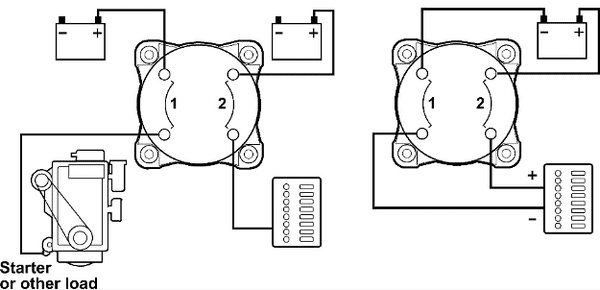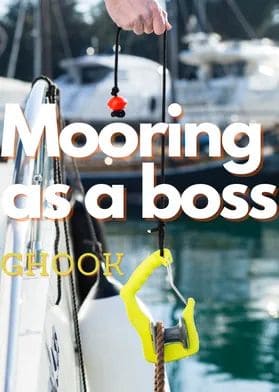Battery SwitchesProducts found: 26
Sale of battery switches
On this page, you'll find a catalog of new batteries switches available for sale on our marketplace. We invite you to check out our prices for switches and, if needed, consult with our staff via the contact information on our website before making a purchase.
All boat batteries switches come with an official warranty from the manufacturer. We offer delivery to almost any location worldwide using well-known courier services.
About Battery Switches
Electricity on every yacht or boat comes from a battery, and often more than one. To switch between them, you need to use a special device – this way choosing a power source is simplified. If necessary, you can also go for a combined (shared) mode of using batteries.
A battery switch is also needed to de-energize the electrical circuit in the event of a short circuit and prevent a fire from starting. Also with its help, a yacht or boat can be disconnected from the electrical supply system in one motion. Thus, it is possible to protect the ship’s electrical equipment from short circuits during repair work or moorings. Plus the battery discharges much more slowly. Using the built-in voltmeter or ammeter, it is convenient to monitor battery consumption.
The switch must be installed with starting batteries, the cold start current of which exceeds 800 A. The most likely cause of a fire in the starting circuit is a jammed starter. But if the battery is small (less than 800 starting amps), the starter will quickly drain the battery and will not have enough energy to start a fire.
Although on a boat with an outboard engine and a starting-only electrical circuit, the standards do not allow a switch to be installed, it is correct to use it everywhere. A switch is also required for a high-capacity traction battery.
The battery disconnect switch is a safety device. But neither single-pole nor selector switches are designed to disconnect batteries under load. Under normal conditions, they isolate the battery only after the current-consuming equipment is turned off. If you regularly use a switch to interrupt the current, its contacts will burn, the resistance will increase, and it itself will cause a fire. Therefore, switches are used to disconnect circuits under load only in emergency situations.
The Most Common Types of Battery Switches
When selecting battery type switches, be guided by the power supply system of your yacht. Among the most common types of this equipment, the following should be noted:
- mechanical with manual control;
- automatic - the action occurs simultaneously with the engine starting;
- electromagnetic or electric - activated by a special button or toggle switch;
- electronic - control via a special board;
The most convenient is the model with a button on the control panel. If the device is not included in the initial configuration of the vessel, the issue can be resolved by purchasing a remote device. The device itself is inexpensive, and its price is determined primarily by the features of the small vessel.
Requirements for Switches
Battery switches are rated for maximum continuous load (tested at rated current for 1 hour) and short-term load (tested for 5 minutes).
The maximum continuous load capacity of a battery switch does not have to be equal to the sum of the currents drawn by the devices in the circuit. Powerful devices rarely turn on at the same time, and if they do, they don’t work for long. Therefore, the rating of the switch is chosen equal to (or greater than) the rating of the supply cable. If the cable is protected from overload by a fuse or circuit breaker, then the switch is also protected.
If several powerful devices are turned on at the same time, the fuse will burn out before the switch melts. If the switch rating is less than the supply cable rating, fuses are selected to protect the battery switch.
Another important requirement for battery switches is the magnitude of the short-term load. For the switch on the starting battery, it should not be less than the maximum starting current determined by the engine manufacturer. This condition is not always feasible. Even for small motors, the starting current often exceeds 1000 amperes at 12 volts.
However, this current is present in the circuit for a fraction of a second, and not for five minutes, as during testing. Therefore, Blue Sea Systems, whose products are widely represented in the topRik marketplace, has developed a standard that is based on 10 attempts to start the engine lasting 2 seconds with a two-second interval and a total test time of 2 minutes. As a result, switches branded Blue Sea have a new characteristic - “Starting Current”, which is two times higher than the maximum permissible short-term load.
Switch for Two Batteries
The two batteries on boats and yachts are traditionally controlled using a selector switch. It has four positions. In the first, both batteries are disconnected from the load, in the second and third they are alternately connected to it, and in the “1 + 2” position they are combined with each other.

The selector switch is designed to prevent the battery dedicated to starting the engine from draining. However, it often turns out that the boat owner forgets to move the switch to the desired position after turning off or starting the engine, or does not remember what position it should be in at that particular moment.
This leads to the fact that during movement only one battery is charged (sometimes not the one needed), and when docked, instead of the service battery, the one intended for starting is discharged. The selector switch does not isolate different circuits from each other and both types of loads remain connected both in position 1+2 and in positions 1 and 2. Because of this, sensitive electronics are always subject to voltage surges when starting the engine; and also lighting, refrigerator and multimedia devices may drain the starting battery
The disadvantages of the four-position model led to the appearance of a two-pole switch in control systems for two batteries. Compared to the selector, it has the following advantages:
- two positions – ON and OFF, both batteries are connected to the load simultaneously with one turn of the handle;
- the starting and service battery circuits are isolated from each other, powerful consumers receiving energy from the service battery do not affect the starting one;
- idles and navigation devices connected to the service battery are protected from power surges when starting the engine;
- electromagnetic interference occurring in the service circuit is not transmitted to the electronic engine control circuits.
The battery switch can be with or without battery pooling function. But in both cases, it eliminates the confusion caused by the selector switch and simplifies load control.
When the double pole switch is set to OFF, both batteries are disconnected. In the ON position, current from the starting battery flows to the engine starting circuit, and from the service battery to the on-board equipment. The COMBINE BATTERIES position connects the batteries in parallel. In this position, the service battery can be used to start the engine if the starting one is discharged, or both batteries can be charged from the generator. You can automate the charging process if you install an isolation relay or a DC-DC charger at the same time as the switch.
Modern batteries are clearly divided into two groups - deep discharge and starter. The former are capable of delivering a current of 5-50 A for several hours or even days. They are used as service ones to power on-board equipment. The second type of battery generates a current of 500-1000 A for 10-15 seconds. They are used to start the engine.
A double-pole switch maintains these associations by separating between two types of batteries with different types of connected loads. The connection of the batteries is indicated on it as a forced position in which the batteries should not remain for long, otherwise one of them will be discharged.


